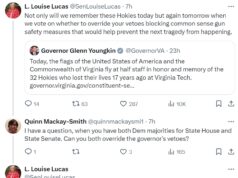by Ben Litchfield
The 2020 Virginia General Assembly session is slightly more than a month away and we are seeing a flurry of prefiling activity. For anyone who is curious to see what bills are being submitted, I would encourage you to follow the Virginia Progressive Legislative Alert Network (VAPLAN) on Twitter. Cindy Cunningham does a fantastic job of cutting through the legalese and giving readers easy to understand summaries of pending legislation.
By far, after reviewing all the pending bills, Virginia Democrats are putting forward some of the strongest, most progressive legislation that we have seen after decades of backwards Republican rule. And this looks to be an historic legislative session as the General Assembly considers ratifying the Equal Rights Amendment, passing common-sense gun safety measures, and ending political gerrymanders in favor of an independent redistricting commission.
However, one bill caught my eye that I feel deserves additional scrutiny by lawmakers in Richmond. On December 5, Delegate Kaye Kory (D – Falls Church) filed a bill that would establish an electric school bus pilot program (so far, so good). The problem with this bill is that it appears to authorize Dominion to implement the pilot program and allow the monopoly to recoup its costs, including the incremental costs of the school buses, through base utility rates.
Dominion, it seems, could also “tap into the storage batteries of the electric school buses in order to access the stored electricity…at times when the school buses are not in use, including periods of power outage or emergency, when energy demand is high, or when renewable energy resources are intermittent, without compensation to the school division for such electricity unless otherwise provided in the agreement between the school board” and Dominion.
Furthermore, the sole criterion for selecting which school divisions are allowed to participate in this pilot program appears to be the “locational benefits that the school buses’ storage batteries are expected to bring to [Dominion’s] electrical system.” Just to recap, this bill appears to: (1) allow Dominion to charge consumers to deploy electric school buses, (2) allow Dominion to use the energy generated by those school buses free of charge, and (3) make the sole criterion for selecting participating school districts whether or not the program is beneficial to Dominion.
That seems like a pretty great deal – for Dominion. But to an outside observer, it just seems like more corporate welfare to an energy monopoly that already has a spotty track record of charging consumers fair rates or making good on its promises to invest in renewable energy. For example, a 2017 study by the Virginia Poverty Law Center (VPLC) found that Dominion significantly lags behind its peers in adopting energy efficiency programs that could save ratepayers more than $10 million in rental homes alone. Rather than investing in these programs, which could save consumers and the monopoly itself money, Dominion passes its costs onto consumers in the form of rate adjustment clauses, or RACs, making our bills the 10th highest in the nation.
Passing costs onto consumers and refusing to innovate should not shock anyone – that’s simply what monopolies do. When a firm has market power, it can raise prices, decrease quality, or some combination of the two, in order to reap monopolist profits from consumers. In inelastic markets, like the energy sector, where high barriers to entry prohibit new market entrants, a monopoly can raise prices even higher or provide a markedly inferior product compared to what you would expect in the free market because there’s no risk that it will have a competitor.
In these types of markets, where antitrust enforcement is not practical, regulation becomes the only effective tool to protect consumers. Here, however, Virginia does not have a strong track record of ensuring that Dominion operates in the public interest. The General Assembly inserts itself into the business of the State Corporation Commission, the cop on the beat that is supposed to protect consumers from any abuse of market power by Dominion, when doing so would please the legislature’s top political donor – the very same monopoly.
So – color me skeptical when I see a bill that would give Dominion another chance to reach into my wallet to clearly serve its own interests while passing it off as if it is doing us all a great public service. I think a better idea would be to establish a block grant program where school districts can apply to the Commonwealth for funds to offset the additional cost of purchasing an electric school bus fleet. That gives the school district the ability to bid out the purchase, to control how it uses the excess energy, and avoids giving Dominion another RAC to stick on our bills.
Those are just my two cents. There may be plenty of valid reasons why Delegate Kory’s bill is the right approach at this time. But, given what we know about how Dominion operates, and its practice of trying to buy its way out of serving the public good, I think it deserves careful scrutiny.


 Sign up for the Blue Virginia weekly newsletter
Sign up for the Blue Virginia weekly newsletter
![Tuesday News: “Johnson gambles on plan separating Israel aid from Ukraine funds”; “It Took One Day for Trump to Get in Trouble at His First Criminal Trial”; “If [Youngkin] wanted to write bills, he should have run to serve in the General Assembly”](https://bluevirginia.us/wp-content/uploads/2024/04/trumptrial-238x178.jpg)







